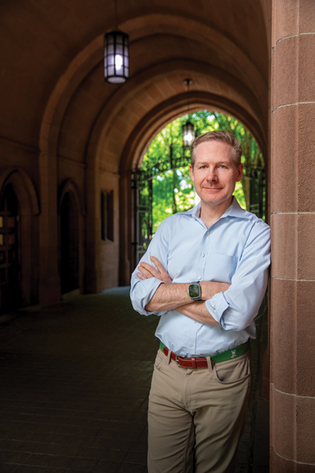
Bob Handelman
Roger Lee ’94—shown here at Phelps Gate during his 30th reunion—changed the way we shop.
View full image
Roger Lee ’94 is a general partner at Battery Ventures, a global investment firm. But 30 years ago—the summer after he graduated from Yale—he changed commerce as we knew it. Now married and the father of three, Lee is also the former president of the Yale University Council and cofounder of the education nonprofit SMART.
Lenore Skenazy: Tell me how you changed the e-world when you were a newly minted Yale grad.
Roger Lee: My junior year, I went and studied at the London School of Economics. I had a very serious girlfriend back at Yale at the time and it cost my parents a lot of money for me to stay in touch with her, because we were on the phone all the time.
LS: Even stateside, we’d call home after 11 p.m. because what’s when the rates went down.
RL: A few weeks into the program, my parents were like, “You’ve got to figure out a cheaper way to stay in touch with your girlfriend.” So I went and asked this guy, Dan Kohn, who I knew was a computer science guy, “Can you show me how to use email?” This was 1992.
LS: Sounds like the era of homing pigeons. I gather he taught you how to email. And then?
RL: I said, “Can I take you out for a beer?” We went to a bar across the street and I said, “Why is email free?” And after a couple of hours back and forth we’re like, “Hey—can we sell stuff on the Internet? Is that even possible?” There was no commercial activity on the Internet at the time. It was really designed as a post-apocalyptic communications grid. We could get hit by a nuclear bomb and the messages would reroute around the net.
LS: But you couldn’t buy cat food on it—yet.
RL: All the stuff we take for granted, like shopping carts and payment services—we had to build them. The summer after graduation, five of us rented a house in New Hampshire. A local grandma would come in and make meals for us. We slept on the second floor, coded on the first, and the basement was our data center. We picked three product categories to sell: music, books, and travel. And then, on August 11, 1994—
LS: Wait! Let me read it to you from the next day’s New York Times:
“At noon yesterday, Phil Brandenberger of Philadelphia went shopping for a compact audio disk, paid for it with his credit card, and made history.
“Moments later, the champagne corks were popping in a small two-story frame house in Nashua, NH. There, a team of young cyberspace entrepreneurs celebrated what was apparently the first retail transaction on the Internet using a readily available version of powerful data encryption software designed to guarantee privacy.
“Experts have long seen such ironclad security as a necessary first step before commercial transactions can become common on the Internet, the global
computer network.”
You transformed e-commerce! And you’ve been at the cutting edge of tech and commerce ever since.
RL: I am so deeply indebted to Yale. I come from blue-collar stock. My grandfather on the Irish side was a cop. My other grandfather was a bus driver. But my dad was a very famous basketball player. And he went to Yale. The amphitheater is named after him.
LS: Your dad is John J. Lee?!
RL: He got drafted by the Knicks but ended up not playing, because back then, professional sports wasn’t a great career. He decided to stay at Yale—get his
master’s in chemical engineering. He changed our family’s lives. I told myself if I ever get lucky I could help kids like my dad.
LS: That’s what your SMART nonprofit does?
RL: Its purpose is to take the most disadvantaged kids in San Francisco—typically, first-generation immigrants at or below the poverty line—who are potential college students.
LS: Like your dad.
RL: We give them access to a great private or parochial school, a tutor, after-school programs, and a mentor. We envelop these kids in middle school, because that’s the most impressionable time in a kid’s life. And chances are they continue that momentum. We just had our 25th anniversary last year. We’ve had approximately 500 kids go through the program, and 90 percent-plus have gone on to a four-year college.
LS: That sounds like a slam dunk! Your dad would be proud.
 loading
loading